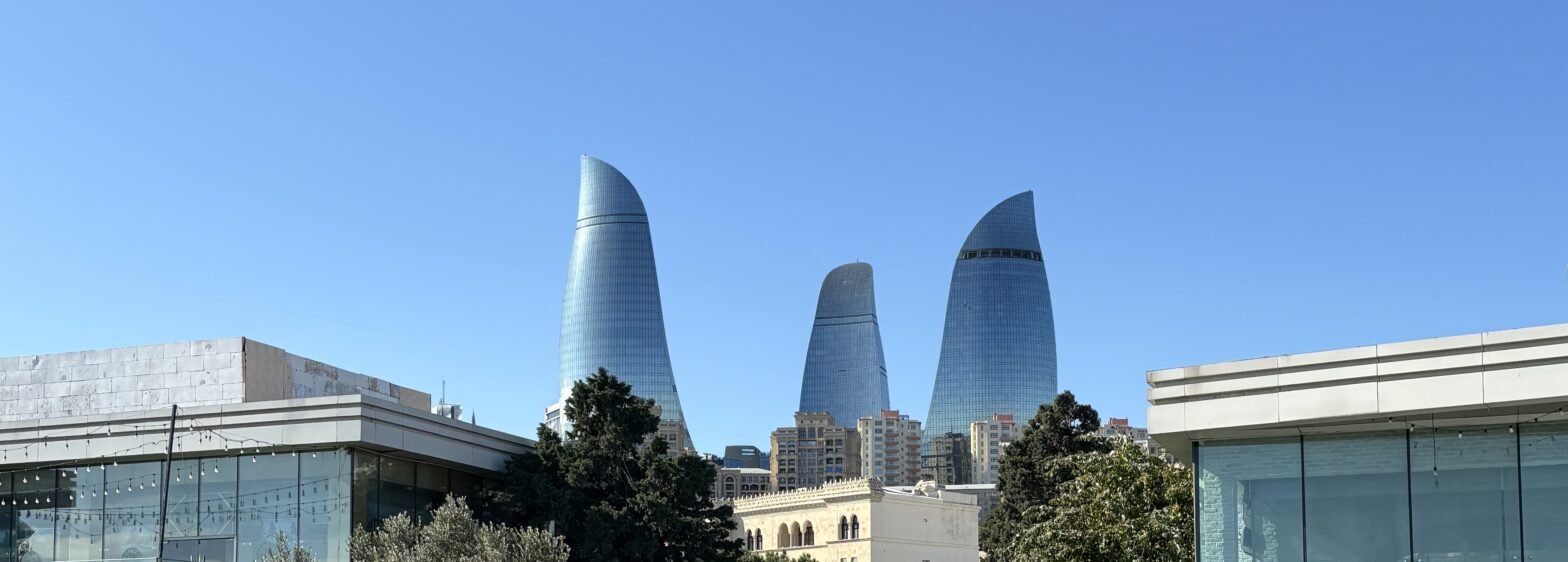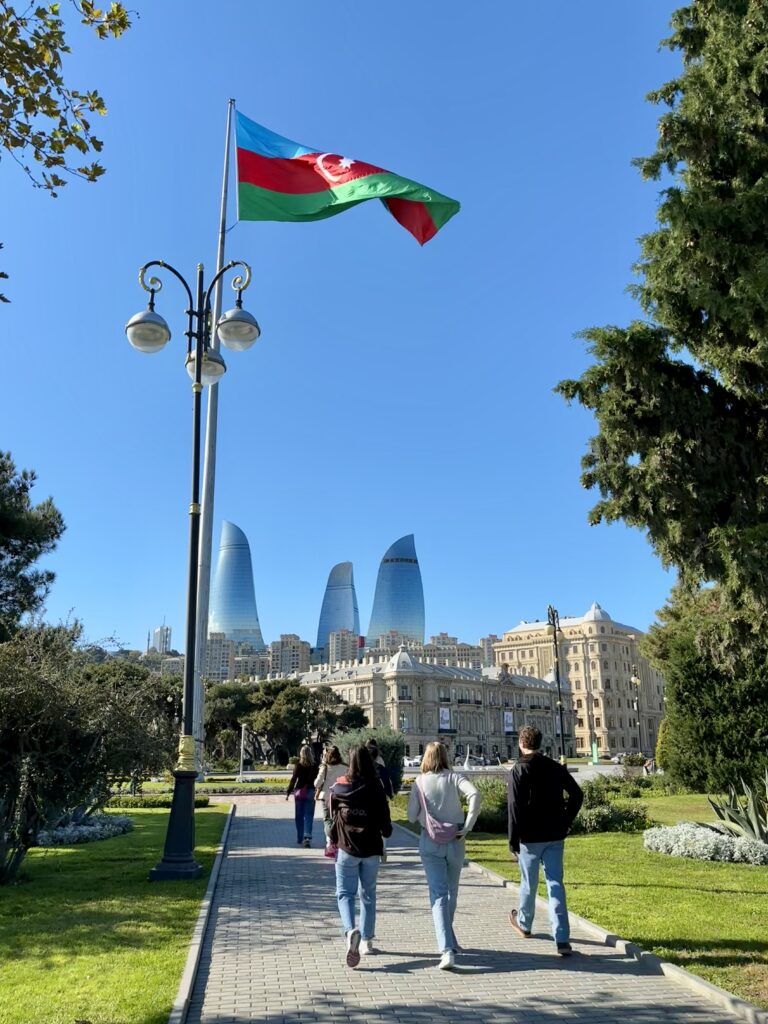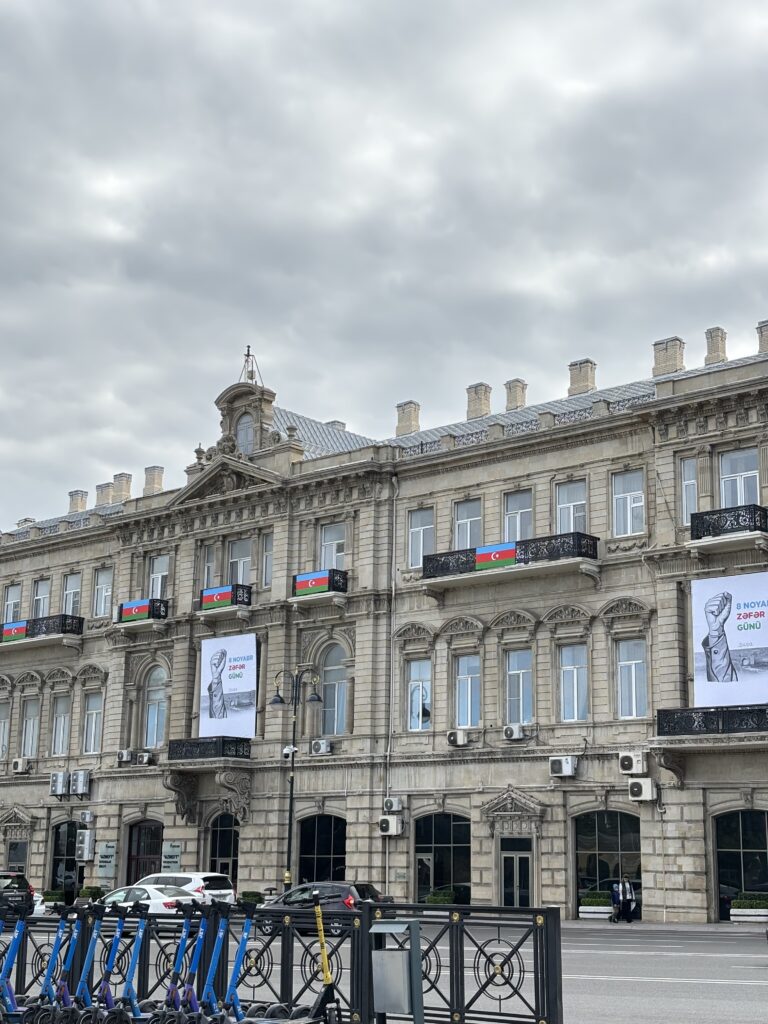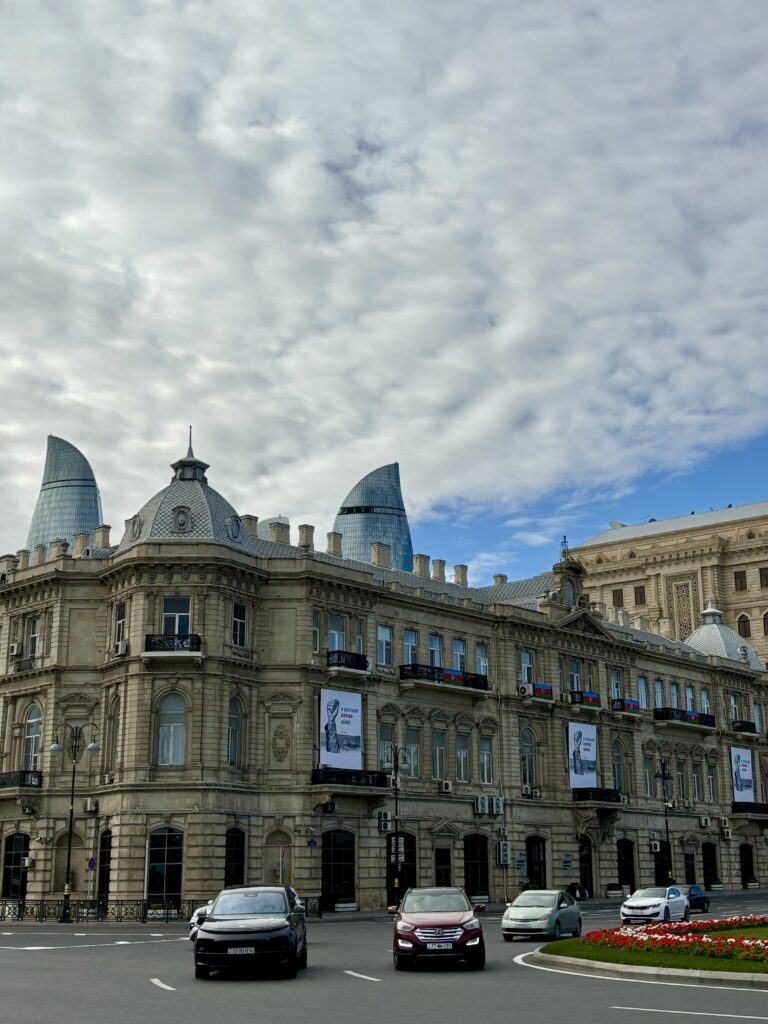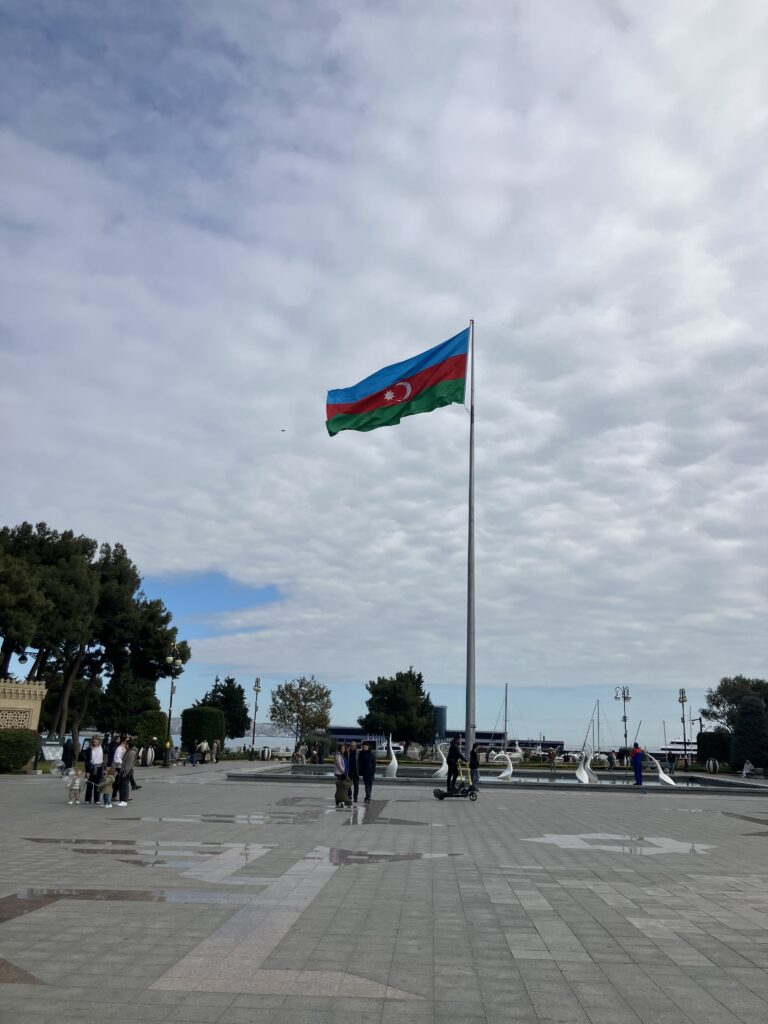By Ella Reese-Clauson, ’26, International Political Economy
We entered the Baku airport at two in the morning local time after a nearly twenty-four hour travel day, amazed by the sloping, modern wooden arches of the terminal. Signs for COP29 in a now-familiar teal color lined the hallway. Our shuttle driver pointed out notable buildings as he maneuvered the still-crowded streets of Azerbaijan’s capital. The Baku Olympic Stadium, the venue hosting COP29, illuminated the skyline as we entered the city, its lighted exterior shining the blue, red, and green of the Azerbaijan flag. The famed flame towers—a trio of sleek, flame-shaped buildings that are three of the city’s many expensive skyscrapers built with new oil money—played a light show on repeat of the country’s waving flag.
After some much-needed sleep to the light murmur of the bustling square outside our hotel, we spent the next day exploring Baku before the conference started. We walked Baku Boulevard, the lakeside promenade off the Caspian Sea, ventured into the world-famous Carpet museum, and wandered the historic Inner City. As we marveled at the juxtaposing medieval arches of a UNESCO heritage site and futuristic architecture of Deniz Mall, the Azerbaijan flag was a constant: young boys ran around in Azerbaijani army suits with the flag as their cape, young women donned it as a scarf, and its colors waved off balcony railings.
That night, we followed the sound of music, heading back to Baku Boulevard. What we found looked a lot like a concert: the music was so loud we could feel it in our bones and two large screens projected the views of performers with stage lights illuminating the night sky. But the notable distinction was the sense of nationalism: fifty-some people hoisted Azerbaijani flags overhead, men dressed in military garb with medals of honor around their necks, and women had the nation’s colors painted on their cheeks. Fireworks exploded over the Caspian Sea and groups huddled in the tunnels under major roads, gleefully dancing to national songs.
With the help of Google Translate, we found out it was a celebration for the national holiday of Victory Day. The victory in question? That of the 2020 Second Nagorno-Karabakh war against Armenia. It was a bloody conflict over a region the Soviet Union had essentially gifted to Azerbaijan but which was populated by ninety five percent ethnic Armenians. After much persecution and many widely disputed death tolls, it ultimately led, on January 1st of 2024, to the Azerbaijani dissolving of the region’s ethnic Armenian enclave. In a move the European Parliament deemed ethnic cleansing, Azerbaijan forced more than one hundred thousand people native to the area to flee in the span of a week, with Baku promising “reintegration” of the region and its population into Azerbaijan (Center for Preventative Action 2024).
Today, Azerbaijan is leveraging its control of this land to support its sustainable imagery and net zero vision for COP29 (Climate Home News 2024). The host nation is prepared to flaunt these regions as “Green Energy Zones,” constructing new hydropower plants and net-zero neighborhoods that will house Azerbaijanis as soon as 2025 (Scheffer 2023).
The prominence of the Azerbaijani flag and the nationalistic fervor we witnessed during the Victory Day celebrations underscored the deep-rooted pride and identity, much of which is tied to the country’s natural resources. As we explored Baku further, this connection to oil became even more apparent. The gift shop of Baku’s Carpet museum proudly displayed porcelain oil wells with the nation’s name lovingly hand painted across the base—a heart-warming souvenir. The Mud Volcanoes Tourism Complex took a similar route, selling dishes painted with images of oil extraction painted with crude oil. Even as we ventured outside of the capital to Gobustan National Park, the legacy of oil was impossible to ignore. We passed the world’s first industrial oil well and could just make out the silhouettes of the imposing oil rigs in the Caspian Sea. Our tour guide at the museum self-deprecatingly attributed the country’s frequent earthquakes to the fact that they pump petrol from the sea as he guided us through an exhibit that all but glorified drilling practices. This same exhibit sat hauntingly close to another display on the flora and fauna of Azerbaijan, many of which face endangerment and extinction today as a result, in part, of those same drilling practices.


Much of Azerbaijan’s wealth and fame come from oil: it is ranked twenty third globally for petrol production and around 90% of the nation’s export revenue is oil-based (State Department 2023). SOCAR, the country’s empire-esque state-owned national oil and gas company, exerts obvious control over the area, with COP29’s president even having done a stint working for them (COP29 2024). Azerbaijani oil is used not only for wealth but for tourism and medicinal purposes, a trend which echoes in Azerbaijani president Ilyam Aliyev labeling fossil-fuels a “gift from God” (Azerbaijan 2024, President of the Republic of Azerbaijan 2024). The nation’s reliance on oil and gas even resonates with its spiritual identity; vast amounts of subsurface gas create continuously burning flames that spurred prehistoric fire-worship practices and more recent Zoroastrian traditions (Azerbaijan 2024). This juxtaposition between Azerbaijan’s oil-fueled prosperity and the environmental consequences of its extraction was particularly striking in light of the country’s hosting of the COP29 climate conference.
For context, the climate COP rotates host regions every year. This year, the region was Central and Eastern Europe, and the UN member states had to choose a host in the region by consensus. Russia vetoed every country except Azerbaijan, refusing to pass a host country that criticized its invasion of Ukraine. Since its selection during COP28, the process has been clearly fraught. Today was the first day of COP29 and diplomats, Big Oil executives, and civil society members from all over the world are converging on Baku. In the coming weeks, we will see how these juxtapositions play out in the context of what is arguably one of the most important international events of the year.
